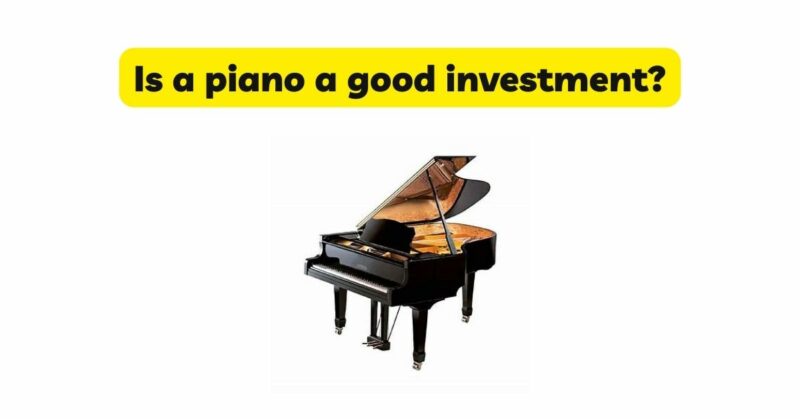Investing in a piano is not just a financial decision but also a commitment to a lifelong journey of musical exploration and personal growth. While pianos can be a significant investment, they offer numerous benefits and value beyond their monetary worth. This article aims to delve into the aspects that make a piano a good investment, exploring both tangible and intangible returns that go beyond the financial aspect. By understanding the broader value of owning a piano, you can make an informed decision about its worth and the impact it can have on your life.
- Tangible Benefits of Piano Ownership:
a. Musical Development: Owning a piano provides an opportunity for musical development and growth. Learning to play the piano offers countless cognitive, physical, and emotional benefits. It enhances memory, coordination, concentration, and fine motor skills. Regular practice and engagement with the instrument can lead to improved musicality, self-expression, and the ability to connect with music on a deeper level.
b. Creative Outlet: Playing the piano allows for creative expression and serves as a powerful outlet for emotions and self-discovery. It enables individuals to compose their own music, arrange existing pieces, and interpret various musical genres. The piano’s versatility and wide tonal range provide endless possibilities for creativity and exploration.
c. Lifelong Skill: Learning to play the piano is a lifelong skill that can be enjoyed and honed throughout one’s lifetime. Unlike many hobbies that may fade over time, the ability to play the piano remains a valuable and fulfilling skill. It offers a sense of achievement and provides opportunities for personal growth, even as interests and priorities evolve.
- Emotional and Personal Benefits:
a. Stress Relief: Playing the piano has therapeutic benefits, serving as a stress-relieving activity. Immersing oneself in music and focusing on the instrument’s keys and melodies can help alleviate stress, anxiety, and tension. The act of playing can be a calming and meditative experience, allowing individuals to find solace and emotional release.
b. Personal Fulfillment: Owning a piano can contribute to a sense of personal fulfillment and accomplishment. Progressing in piano playing, mastering new pieces, and witnessing personal growth can boost self-confidence and self-esteem. The sense of achievement that comes with overcoming challenges and achieving musical goals adds value to the investment in a piano.
c. Family Bonding and Connection: A piano can serve as a centerpiece for family bonding and connection. It provides an opportunity for family members to come together, share music, and create memories. Playing the piano as a family or hosting musical gatherings can strengthen relationships and create a sense of unity.
- Cultural and Educational Value:
a. Preservation of Cultural Heritage: Pianos are deeply rooted in musical history and have played a significant role in countless compositions across various genres. Owning a piano allows individuals to connect with the cultural heritage associated with the instrument and its repertoire. It fosters an appreciation for classical music and its rich traditions.
b. Educational Tool: Pianos serve as valuable educational tools, particularly for children. Learning to play the piano enhances cognitive abilities, discipline, and perseverance. It supports academic development, as research has shown a correlation between music education and improved academic performance, particularly in mathematics and language skills. Having a piano at home encourages regular practice and engagement with music.
- Financial Considerations:
a. Appreciation of Value: While pianos are not typically considered short-term financial investments, high-quality pianos from reputable brands can appreciate in value over time. Vintage and well-maintained pianos can become more valuable due to their rarity, historical significance, and craftsmanship. However, it’s important to note that the primary value of a piano lies in its musical and personal benefits, rather than its financial return.
b. Potential Resale Value: In the event that you decide to sell your piano in the future, a well-maintained instrument from a reputable brand can hold its value or even command a higher resale price. This is particularly true for sought-after pianos with unique characteristics, limited production runs, or historical significance. However, it’s essential to research the piano market and consult with experts to determine the potential resale value of a specific instrument.
Conclusion:
While the decision to invest in a piano should not be based solely on its financial return, it offers a wealth of benefits that extend beyond monetary value. A piano serves as a gateway to musical expression, personal growth, creativity, and emotional well-being. It provides a lifelong skill, a sense of fulfillment, and the opportunity for family bonding. Additionally, it contributes to the preservation of cultural heritage and offers educational advantages. While pianos can appreciate in value over time, their primary worth lies in the immeasurable enrichment they bring to the lives of individuals and families.
Ultimately, the decision to invest in a piano should be driven by your passion for music, the desire for personal growth, and the joy that playing the piano can bring to your life. By recognizing the diverse benefits of piano ownership, you can make an informed decision that aligns with your musical aspirations and personal fulfillment.


